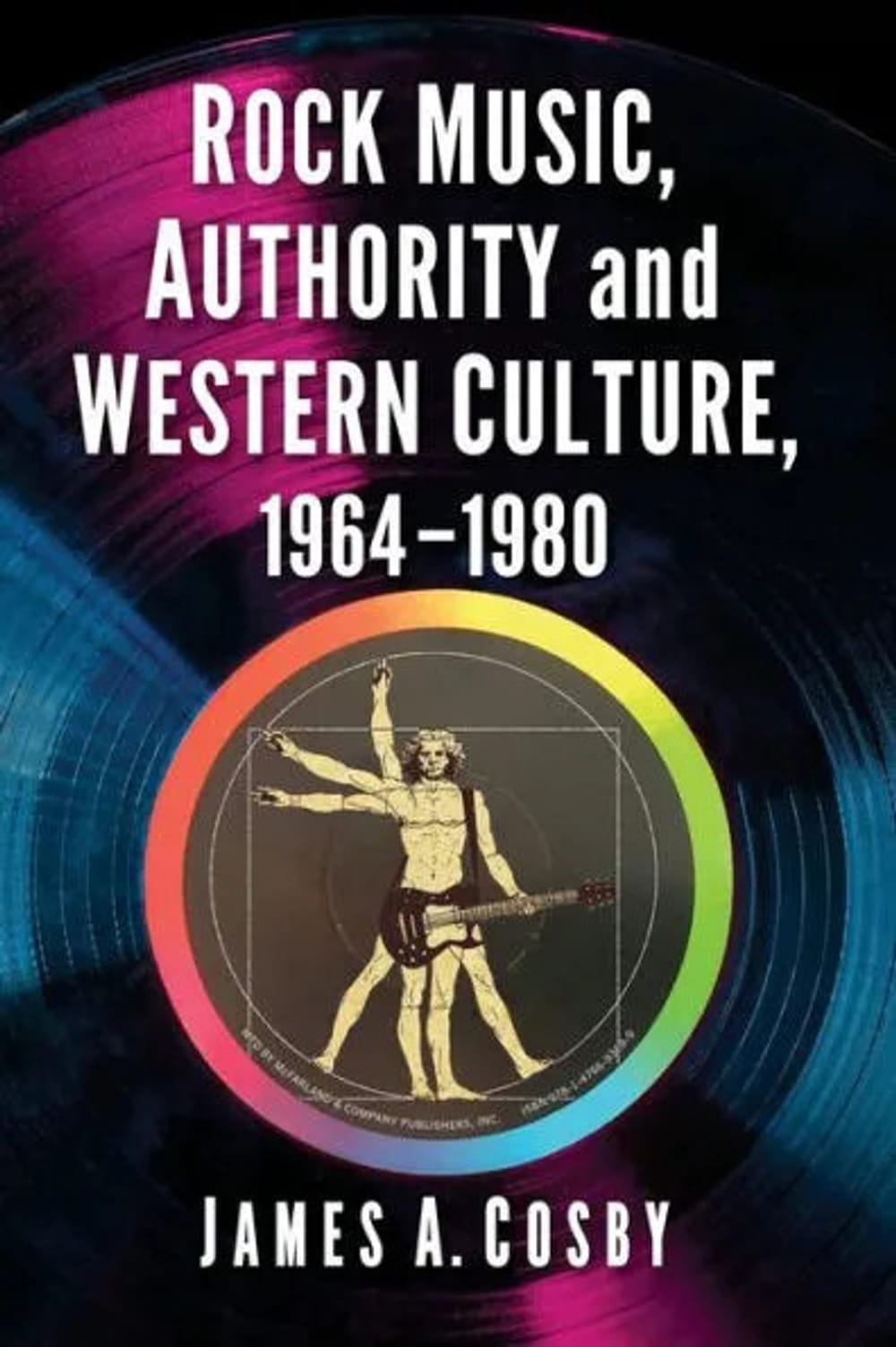Stay in the Loop
BSR publishes on a weekly schedule, with an email newsletter every Wednesday and Thursday morning. There’s no paywall, and subscribing is always free.
The arc of rock
Rock Music, Authority and Western Culture, 1964-1980, by James A. Cosby

As long as we’re talking about Western culture, let’s start with Freud, who is thought to have said "Civilization began the first time an angry person cast a word instead of a rock.”
No doubt civilization has always had its discontents, and no doubt they have always raged against its mechanisms of pacification and conformity, in ragged and often scattershot opposition. Freud never played in a band. (So far as we know.) But if we seek a marker of that resistance in the 20th century, a gauge for its progress, a reflection of its spirit, we could do worse than study rock music.
So much is done, and done well, in local author James A.Cosby’s Rock Music, Authority and Western Culture, 1964-1980, the second book of a proposed three in his sociopolitical history of rock and roll. To hear Cosby tell it, rock is “the single most illustrative and helpful vehicle for understanding the ongoing arc of civilization.” And he might be right.
“The unique story of rock music,” Cosby writes, “can indeed be placed squarely into this still-unfolding great arc of Western civilization and an ongoing quest to reconcile authority with greater individuality.”
Greatest Hits of late 20th-century America
However we might want to look at it, Rock Music solicits a careful and interested read. It’s history with bass guitar and backbeat, a Greatest Hits of late 20th-century America. Rock music entwined the great issues of the time—war, drugs, nuclear threats, assassinations—and contained them in a cry of pain and determination.
After a half-century of World Wars, the late 20th century produced its own upheaval, one no less transformational for being so inward and personal. An undeclared war rolled ever onward in Vietnam, taking thousands of American lives, shattering intergenerational loyalties at home, and further dispersing the shared ethos of the country.
Cosby’s book is a chronology of that era as reflected in long hair and startling electric chords. We tour the cultural checkpoints of the decades: the protests, the left-right partisan divide, the wars, the chaos. We get closeups of the hippies in Haight, the pop artists in Manhattan, and the Summer of Love.
Meet the bands
The history of the bands themselves gets abundant space, including The Beatles, whose “historic talents” John Lennon and Paul McCartney grew up in the same area of Liverpool at the same time. This was “either an outrageous statistical coincidence or other factors helped to create their seemingly almost otherworldly chemistry, along with George Harrison and Ringo Starr.”
We follow the Stones. We watch James Brown. We get to know Elvis. We see the development of rock from the confluence of blues, Black gospel, white country music, and a big dose of rebel yell. We see such outliers in the stream as Aleister Crowley, the English character who led his own counter-cultural movement that influenced the music.
Through it all, we watch the progress of rock as it disrupts the humdrum quotidian and reshapes the Western project to accommodate youthful energies that had lain dormant since the end of World War II when all of America acquiesced in the tranquility of the peace. We learn where rock came from, where it almost went but didn’t, and why white men no longer dance to it.
A provoking background track
Above all, we get a firm sense of the painful national transitions that produced modern America (modern in this case meaning after 1990). Cosby clearly worked hard. Readers with the remotest interest in the change wrought by the late 20th century, or who are even slightly curious how social movements mirror the political, will want to clear shelf space for these books, along with anyone looking for a well-rounded view of the history of that era.
Readers may not completely fall in with the notion that rock had any great influence in the history of political convulsion. Some would call it less cause than concomitant, a post hoc ergo propter hoc. But few will deny it played provokingly in the background of that long disturbance, like the score of an epic movie.
That is not really Cosby’s point anyway. As he amply illustrates, rock music can no more be separated from the second half of the 20th century than a musician from his instrument. As a sociological work, his accomplishment is impressive, and this book and its fellows should find a place among the great surveys of the era.
What, When, Where
Rock Music, Authority and Western Culture, 1964-1980. By James A. Cosby. Jefferson, North Carolina: McFarland and Company, Inc., January 24, 2024. 288 pages, paperback; $39.95. Get it here.
Sign up for our newsletter
All of the week's new articles, all in one place. Sign up for the free weekly BSR newsletters, and don't miss a conversation.

 Rob Laymon
Rob Laymon